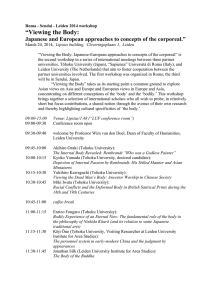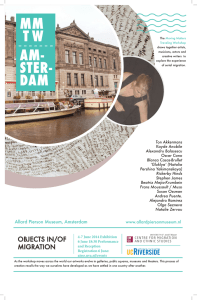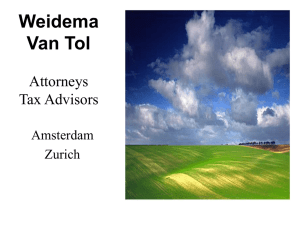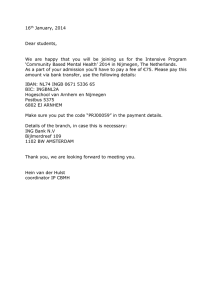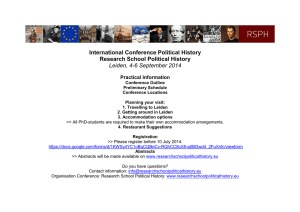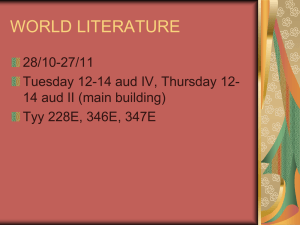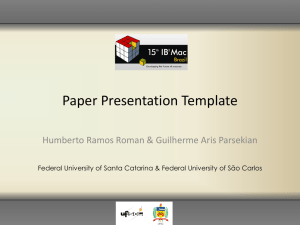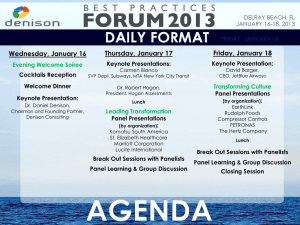Program - Onderzoekschool Politieke Geschiedenis
advertisement
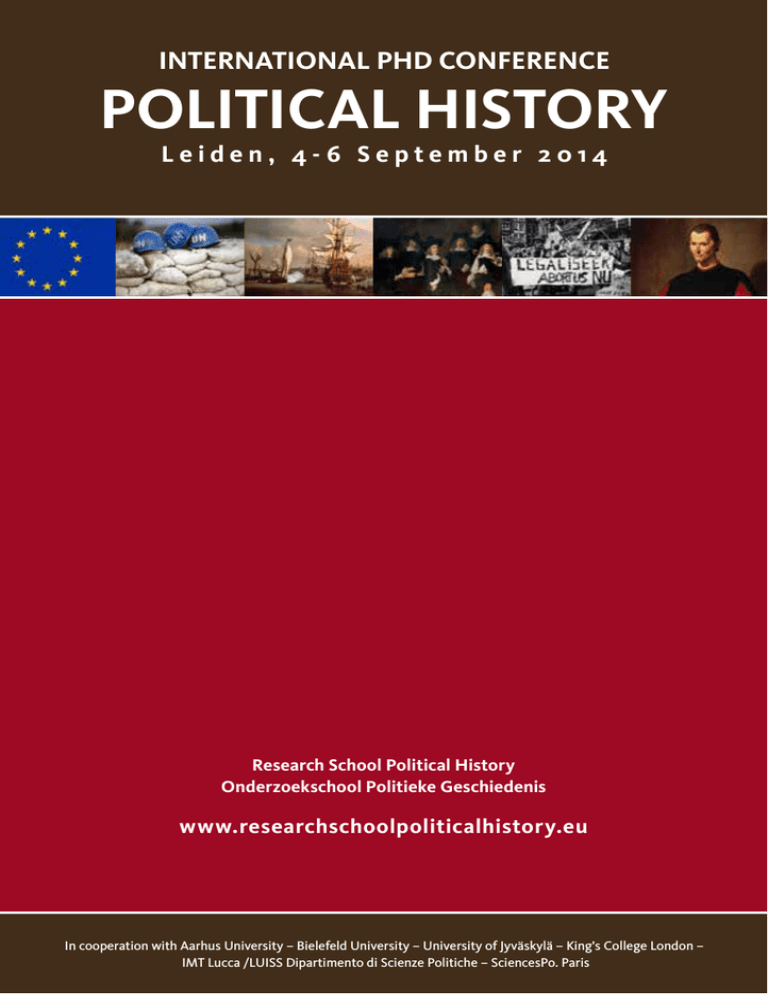
International PhD Conference Political History Leiden, 4-6 September 2014 Research School Political History Onderzoekschool Politieke Geschiedenis www.researchschoolpoliticalhistory.eu In cooperation with Aarhus University – Bielefeld University – University of Jyväskylä – King’s College London – IMT Lucca /LUISS Dipartimento di Scienze Politiche – SciencesPo. Paris International PhD Conference Political History Leiden, 4-6 September 2014 Political history has always been one of the central elements of the discipline of history. Traditionally, this field was very nationally oriented, and even today much attention continues to be paid to the role of the nation state (and with good reason). In recent decades a new interest in concepts, representation, political culture and institutions, gender history and transnational history has defined a ‘new political history’ that also questions its national orientation. To strengthen the old discipline and this new historiographical moment it is an ideal time to bring together (young) researchers specializing in political history with ideas about the future of the discipline. Therefore the Dutch / Flemish Research School Political History has invited scholars throughout Europe to come together to present and discuss their work. By organizing the second in a series of conferences, and the first one with an open call, we aim to strengthen cooperation between researchers and to contribute to the further internationalization and development of the field. We have encouraged PhD candidates to submit a proposal that presents their research. We consider preparing for and participating in such meetings an important part of an academic education. The three-day conference will cover a broad range of topics, reflecting the current transformations the field has experienced. Each theme has been prepared by a working group coordinated by experts in the field. Kiran Klaus Patel (Maastricht University) will deliver a keynote address on transnational perspectives. The conference will start with a discussion on the future of the history of politics. During the conference, an international association for political history will be established, which will organize future annual conferences. The initial meeting was held at IMT in Lucca (March 2014), and the 2015 conference will be in Bielefeld. Future conferences are planned for France, Aarhus University, the University of Jyväskylä and King’s College University of London. International Conference Political History Practical information: www.researchschoolpoliticalhistory.eu with details on maps, accommodation, restaurants etc. Registration desk: On Thursday, from 12.15 at the Academy Building Meeting room during the conference: - Lipsius Building, Cleveringaplaats 1, room 148 (first floor) - Information desk in the hall of the Lipsius Building Follow us on twitter: ResearchPolHistory, @ResPolHistory Program 4-6 September The program may be subject to changes Thursday 4 From 12.15 Registration at the Academy Building 15.00 18.00 Workshops Coffee & Tea @ Lipsius Building, room 148 - before the start of the workshops (optional) - around 16.30 (break) Lipsius Building, Cleveringaplaats 1 1. Parliamentary, Constitutional and Extraparliamentary Politics Coordinators: Mieke Aerts (University of Amsterdam), Pasi Ihalainen (Jyväskylä University), Maartje Janse (Leiden University) and Henk te Velde (Research School Political History /Leiden University) Presentations by: a. Ville Häkkinen (University of Jyväskylä) Rhetoric and Ideology in Interwar Hungary. b. Camiel Oomen (Georg-August-Universität Göttingen) A closer look at the repertoire used by Dutch youth movements in their quest for ‘popular unity’ (volkseenheid) in the interwar years. c. Eoghan Moran (Queen Mary University of London) Mass Politics and the Crisis of the 1930s: Transnational Origins of the French andSpanish Popular Fronts. Lipsius Building, room 208, (second floor) Academy Building, Rapenburg 67-73. 13.00 Welcome by Henk te Velde (Research School Political History / Leiden University) Round table The Future of the History of Politics Round table, inspired on the publication by Willibald Steinmetz and others (eds.), Writing Political History Today (2013). With contributions of Willibald Steinmetz (Bielefeld University), Mieke Aerts (University of Amsterdam), Giovanni Orsina (IMT Lucca), Richard Vinen (King’s College London) Chair: Henk te Velde Academy Building Rapenburg 67-73. Room: Klein Auditorium 2. Informal Power Coordinators: Hans Cools (Leuven University) and Ida Nijenhuis (Research School Political History / Huygens ING/Radboud University Nijmegen) Presentations by: a. Michael Humphries ‘The old story – Power and Place are not often synonymous’: the influence of social and political networks in Edwardian Britain. b. Federico Giona (IMT Lucca) ISPI, The First Italian Think Tank in International Politics. A Story of persistance and disruption (1933 – 1970). Lipsius Building, room 130 (first floor, right wing) 3. European and International Organisations 6. Violence, Conflict and Security Coordinators: Ann Christine Lauring Knudsen (Aarhus University), Wim van Meurs (Radboud University Nijmegen). Coordinators: Joost Augusteijn (Leiden University) and Jacco Pekelder (Utrecht University) Presentations by: Presentations by: a. Tommaso Milani (LSE International History Department) From laissez-faire to supranational planning: The economic debate within the Federal Union (1938-1945). b. Lennaert van Heumen (Radboud University Nijmegen) Transatlantic contacts and early European integration, 1945-1957. a. Lisa Bald (Institute for Advanced Studies in Lucca) Once totalitarian, always totalitarian? Political communication concerning left-wing terrorism in European Countries. b. Chiara Zampieri (University of Roma Tre) The Italian democracy at the test of subversion: a first summary of the political debate on the counter-terrorism legislation (1979-1982). c. Anselm van der Peet Operations outside the NATO Treaty area by the Royal Netherlands Navy 1945– 2001. Lipsius Building, room 204, (second floor, left wing) 4. State Building/ State and nation in the 18th and 19th century Lipsius Building, room 001, (ground floor, left wing) Coordinator: Ido de Haan (Research School Political History / Utrecht University) Presentations by : a. Jens van de Maele (Ghent University) A failed attempt to build a modern state. On the office buildings for the Belgian ministries during the 1930s. b. Karen Vannieuwenhuyze (University of Antwerp) Using and producing urban political space. J.F. Loos in formal and informal Antwerp. Lipsius Building, room 235C, (second floor, right wing) 5. Religion and politics Coordinators: James Kennedy (Research School Political History / University of Amsterdam) and Bart Wallet (Free University Amsterdam) Presentations by: a. Leonard van ’t Hul (University of Amsterdam) Religion renegotiated: The Dynamics of State-Religion Interlocution in the Netherlands since the 1960s. b. Koen Docter (European University Institute Florence) Secularism and media representations of Muslims and Islam: a historical comparison between France and the Netherlands (1880-present). c. Ion Josan Politics and Spirituality – Khomeinism between Transcendence and Imanentization. Lipsius Building, room 030 (ground floor, left wing) 18.15 - 19.30 Welcome by Henri Lenferink, the mayor of Leiden. Drinks at the Town Hall. We will walk together from the central hall of the Lipsius Building to the Town Hall at 18.00. Town Hall, Stadhuisplein 1 Friday 5 All day Information desk in the hall of the Lipsius Building Lipsius Building, Cleveringaplaats 1 9.00 Key note lecture by Kiran Klaus Patel (Research School Political History / Maastricht University) Transnational History. The Debate 20 Years on. b. Maud Harivel and Florian Schmitz (SNF Research Assistant University of Berne) Entangling formal and informal power. Corruption as an in-between in early modern politics (Venice and Berne, 16th – 17th century). c. Ettore Cafagna (University of Verona) Representing the Power through diplomacy: Venice and the Dutch Republic in the early XVII century. Lipsius Building, room 130 Lipsius Building, Room 0.11, (Ground floor, to the right) 10.00 – 13.00 Workshops 3. European and International Organisations Coffee & Tea @ Lipsius Building, room 148 - before the start of the workshops (optional) - around 11.30 (break) Coordinators: Ann Christine Lauring Knudsen (Aarhus University), Wim van Meurs (Radboud University Nijmegen). 1. Parliamentary, Constitutional and Extraparliamentary Politics Coordinators: Mieke Aerts (University of Amsterdam), Pasi Ihalainen (Jyväskylä University), Maartje Janse (Leiden University) and Henk te Velde (Research School Political History / Leiden University) Presentations by: a. René Koekkoek (Utrecht University) Rethinking Citizenship after the Jacobin Terror. b. Laurien Hansma (University of Groningen) Orangist concept of constitution 1795-1798. c. Anne Petterson (Leiden University) Negotiating the Nation, 1850-1900. d. Naomi Lloyd-Jones (King’s College London) Scottish Nationalism, Liberalism and the Home Rule crisis. Lipsius Building, room 208 2. Informal Power Coordinators: Hans Cools (Leuven University) and Ida Nijenhuis (Research School Political History /Huygens ING/Radboud University Nijmegen) Presentations by: a. Lauren Lauret (Radboud University Nijmegen) Matters of formality? – Johan Kelffken (1578-1602) merchant, mayor and delegate. Political power relations between local, provincial and general assemblies. Presentations by: a. Quentin Jouan (Université catholique de Louvain) The Europeanization of trade unions in a historical perspective: theoretical framework and analysis of the Belgian case. b. Richard McMahon (University of Edinburgh) History creates transnational spatial patterns, which affect the spatiality of differentiated integration. Lipsius Building, room 204 4. State Building / State and Finance Coordinator: Ido de Haan (Research School Political History / Utrecht University) Presentations by: a. Alberto Feenstra (University of Amsterdam) Reliable sovereigns under deteriorating circumstances. The debt management of the Province of Zeeland during a period of economic decline. b. Pieter Slaman (Campus The Hague Leiden University) The student’s state. Political history of public student support policies in the Kingdom of the Netherlands, 1815-2015. Lipsius Building, room 235C Saturday 6 5. Colonial Approaches to Empire and Nation States/ Negotiating the European Imperial Space Coordinator: Susan Legêne (Free University Amsterdam) Presentations by: a. Filippo Espinoza The relation between the Italian administration over the Aegean Archiepelago and the fascist expansionism. b. Hans van de Jagt (Free University Amsterdam) Neo-Calvinism, politics and race in the Dutch East Indies, 1900-1920. c. Tjalling Bouma (Free University Amsterdam) Divide and rule? A critical approach to the historiography of Federal Indonesia. d. Cynthia Scott (Claremont Graduate University) Renewing the “Special Relationship”: Dutch Cultural Cooperation as Development Aid in Suharto’s Indonesia. Lipsius Building, room 030 13.00 [Photo moment] Lunch Lipsius Building, Room 148 14.00 – ± 15.00 Meeting to discuss association Lipsius Building, Room 148 09.00– 12.00 Workshops Coffee & Tea @ Lipsius Building, room 148 - around 11.30 (break) 1.Parliamentary, Constitutional and Extraparliamentary Politics Coordinators: Mieke Aerts (University of Amsterdam), Pasi Ihalainen (Jyväskylä University), Maartje Janse (Leiden University) and Henk te Velde (Research School Political History / Leiden University) Presentations by: a. Enika Bushi (IMT Institute for Advanced Studies Lucca) Chained to the past. Albania, (in)glorious road to democracy. b. Krzysztof Kirdzik (University of Gdansk) Political liberalization in Yugoslavia after the fall of Aleksandar Rankovic in 1966. Was it the beginning? Lipsius Building, room 208 2. Informal Power 14.00 – ± 15.00 Informal Meeting for PhD Students Coordinators: Hans Cools (Leuven University) and Ida Nijenhuis (Research School Political History /Huygens ING/Radboud University Nijmegen) Huizinga Building, Coffeeroom (second floor) Presentations by: 15.30 - 17.00 Guided Tour Leiden Departure: 15.30 from Lipsius Building, room 148 17.30 Transport to the sea Departure: 17.30 from Lipsius Building, room 148 19.00 Social Dinner at sea in De Badmeester (www.debadmeester.nl) 22.00 Departure to Leiden (arrival at Molen de Valk, close to central station) a. Elina Kauppinen (University of Jyväskylä) The role of official royal mistresses in eighteenth-century Western Europeandiscourses on the legitimacy of monarchical rule: Methodological perspectives. b. Mark Hay (King’s College London) Dynastic Networking as a Strategy of Conflict Resolution: The Historical Agency of Lesser Powers in the Revolutionary and Napoleonic Era Revisited. c. Ann Poulson (King’s College London) Britain, France, and the diplomacy of painting between 1837 and 1870. Lipsius Building, room 130 3.European and International Organisations Presentations by: Coordinators: Ann Christine Lauring Knudsen (Aarhus University), Wim van Meurs (Radboud University Nijmegen). a. Georgios Regkoukos (King’s College London) Colonies’ closer to home? Panslavism and the russification of Ukraine in the age of Gogol and Tchaikovsky (1820-1890). b. Melek Maksudoglu Minorities in their homeland; The Crimean Tatars. c. Wim Manuhutu (Free University Amsterdam) Shifting the balance: Cultural cooperation After Empire. d. Klaas Stutje (University of Amsterdam) Indonesian nationalism from afar: A reinterpretation of the concept of Long Distance Nationalism. Presentations by: a.Daniel Stinsky (Maastricht University) Planning for Peace: Postwar Internationalism and European Reconstruction. b. Bart De Sutter (University of Antwerp) The making of the International Helsinki Federation for Human Rights (1982-2007): (dis)continuities, contradictions and alternatives. c. Boyd van Dijk (European University Institute in Florence) The Fourth Geneva Convention: Reinventing the Laws of War after WWII. Lipsius Building, room 030 12.00 Conference 2015 in Bielefeld, by Thomas Welskopp (University of Bielefeld) International cooperation, Marc Lazar SciencesPo. Paris Launch of the association Lipsius Building, room 204 4. State Building / Materiality of political structures Coordinator: Ido de Haan (Research School Political History / Utrecht University) Presentations by: a. Klaas van Gelder (Ghent University) Governing Remote Regions: The Implications of Distance for the Establishment of Austrian Rule in the Southern Netherlands (17161740). b. Tamàs Székely Nation- and state-building in Austria-Hungary 1867-1914. c. Marijcke Schillings (Huygens ING, The Hague) Social networks and state formation in the Netherlands during the first half of the 19th century. Lipsius Building, room 235C 5. Colonial Approaches to Empire and Nation States / Long distance nationalism and developing a sense of (indigenous) community in exile and return Coordinator: Susan Legêne (Free University Amsterdam) Conclusions Lipsius Building, room 0.03 (Ground floor, left wing) 13.00 Lunch (optional) Lipsius Building, room 148 Discussants: Elisabeth Buettner (University of Amsterdam) Ulrike von Hirschhausen (Rostock University) Marc Lazar (SciencesPo. Paris) Jörn Leonhard (Albert-Ludwig Universität Freiburg) Kiran Klaus Patel (Maastricht University) Giovanni Orsina (IMT Lucca) Nicolas Roussellier (SciencesPo.Paris) Richard Vinen (King’s College London) Thomas Welskopp (University of Bielefeld) Notes Organization Research School Political History (Onderzoekschool Politieke Geschiedenis) Prof. dr. Henk te Velde Dr. Margit van der Steen Eveline van Rijswijk M.A. In cooperation with the coordinators of the workshops Contact Research School Political History Dr. Margit van der Steen, Coordinator Address: Huygens ING P.O.Box 90754 2509 LT The Hague margit.van.der.steen@huygens.knaw.nl Information www.researchschoolpoliticalhistory.eu The Research School Political History (RSPH) is a research network of political historians in the Netherlands and Flanders, working to promote high-quality research and to strengthen (inter)national cooperation. In addition, the RSPH provides first-rate training for PhD and Research Master’s students. The RSPH was established in 2011.
